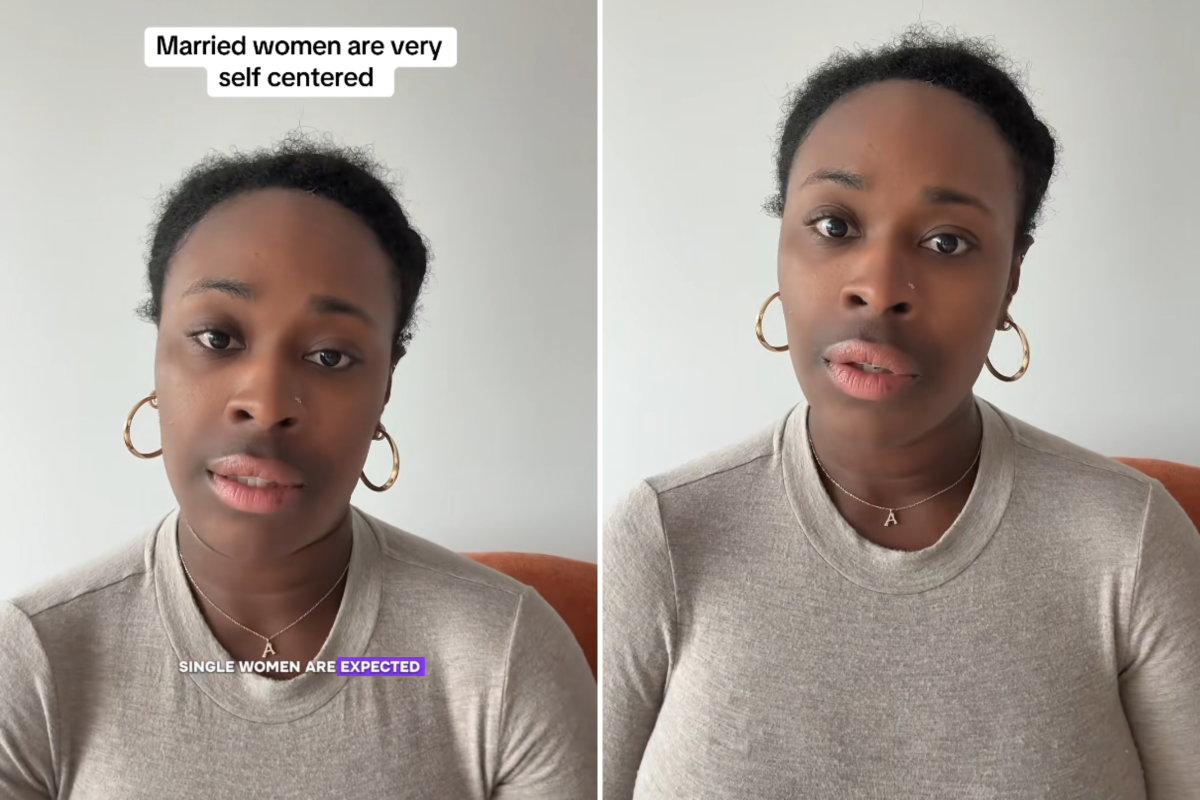
A single woman has gone viral after sharing her take on why she thinks marriage makes women become “very self-centered.”
Posting to her 27,700 TikTok followers, Ashanti, 36, said that she thinks married women don’t invest enough time into the lives of their single friends. While unmarried women are expected to attend bachelorette and engagement parties, baby showers, and celebrate every milestone, Ashanti doesn’t believe that married friends give the same energy in return.
Indeed, Ashanti, who resides in New York, told Newsweek that married women tend to “become deeply absorbed in their identities as wives and mothers.” As a result, they pull back from the female friendships they have held for many years, according to Ashanti, who goes by @unpunishablewoman online.
“While some reorientation is natural, what we often see is that many married women completely neglect or abandon their single friends,” Ashanti said. “When children arrive, many friendships become entirely dictated by motherhood—social time revolves around the child, and adult-to-adult connection disappears.”
Single friends may not hit the same milestone events as those in relationships, but that doesn’t mean they aren’t succeeding or thriving. Ashanti said that women will gladly support their friends through every life event, from proposals to pregnancy, but do those in relationships ever champion their single friends?
This is, in part, why Ashanti believes that many women treat their single friends merely as “emotional placeholders” during the dating phase of their life.
Ashanti said: “Single friends are frequently viewed through stereotypical lenses as jealous, naive, or even as threats. There’s also a subtle hierarchy that emerges where some married women see their own lives as more purposeful because of marriage and motherhood, and that shift often shows as reduced enthusiasm toward their single friends’ lives, goals, and achievements.
“Even when conversations happen, they often revolve around dating—treated as light entertainment rather than real-life experiences. But when it comes to celebrating professional wins, creative pursuits, or milestones unrelated to partnership, the energy isn’t the same,” she continued.
Although Ashanti hasn’t spoken to many men about this phenomenon, she said it predominantly impacts women. It is widely expected that a woman will overhaul her life for marriage or children, and that often leaves them making significant sacrifices.
Lisa Rabinowitz, a certified Gottman and PACT couples’ therapist and relationship coach, told Newsweek that what is often considered as self-centered may actually be a sign of “cognitive overload.”
As a licensed clinical professional counselor, Rabinowitz said that women’s feelings toward their friends don’t necessarily change, it is just that time constraints and their emotional energy are impacted.
Rabinowitz said: “In therapy, many women share that, when they got married, they felt like they had to start juggling their partner’s needs, the household and their needs. They describe how frustrated and disappointed they feel that they are dropping the friend ball.
“What looks like self-centeredness is often simply not having the bandwidth to deal with one more issue. Their mental and emotional energy is consumed by what’s immediately in front of them.”
Rather than having a spontaneous connection with friends, Rabinowitz said that women with other responsibilities may have to shift toward an “intentional connection” instead. This can be done through sending short messages to check in with single friends. Likewise, single friends should communicate their feelings if they feel rejected or let down.
“Your relationship has changed, but it doesn’t mean it’s over. I believe that mutual empathy and compassion can foster friendships during times of change,” Rabinowitz said.
The Online Response
After sharing her thoughts online, Ashanti has been blown away by the social-media response. The TikTok video has generated over 272,700 views and more than 30,200 likes at the time of writing.
Evidently, her perspective struck a nerve with others.
“Single women don’t expect friendships to look exactly the same as before marriage, but they do hope for occasional meaningful connection and reliability,” Ashanti said. “Too often, contact only resumes when the married friend is struggling because the single friend represents a familiar, safe outlet.”
Many women reached out to Ashanti to thank her for speaking about something that has left them feeling abandoned by their own friends. But not everyone agrees, as some commented to justify the breakdown of friendships as life progresses.
Either way, Ashanti told Newsweek that this clearly isn’t a niche issue, and it is a “widespread emotional fracture” between women of all backgrounds. She said married women should celebrate their single friends, listen to their needs, and just be present.
Ashanti continued: “Single friends just want acknowledgment and meaningful interest. They don’t expect daily calls or endless free time; they just want to be seen. When you do connect, focus on the friendship itself, not only your marriage or kids.”
Do you have any viral videos or pictures that you want to share? We want to see the best ones! Send them in to life@newsweek.com and they could appear on our site.
